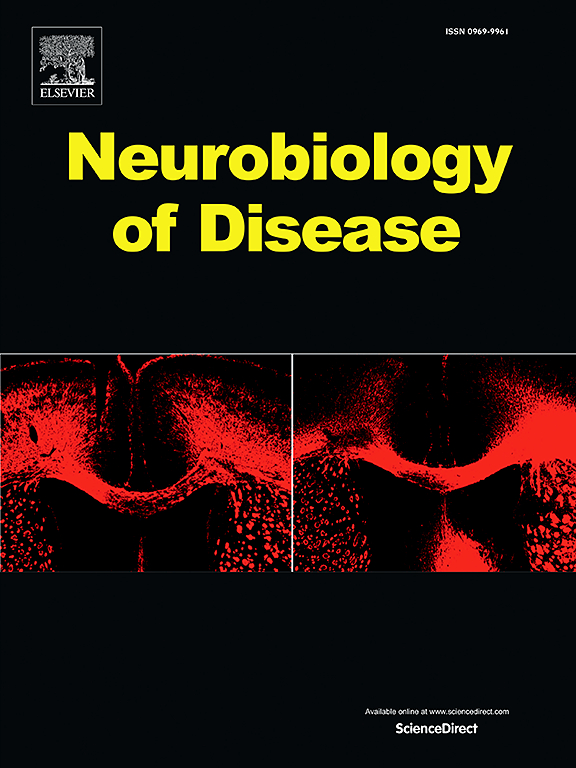Effect of primary structural variation on cervid prion protein in flexibility, stability, and spontaneous misfolding propensity
IF 5.1
2区 医学
Q1 NEUROSCIENCES
引用次数: 0
Abstract
Protein misfolding is central to numerous neurodegenerative disorders, collectively known as proteinopathies, which include Alzheimer's disease, Parkinson's disease, and prion diseases, among others. In many cases, specific polymorphisms of the proteins associated with these diseases influence their misfolding. However, the precise ways in which these polymorphisms affect protein integrity and how they contribute to misfolding propensity remain unclear. In the case of prion diseases, they are caused by prions or PrPSc, the misfolded isoforms of the cellular prion protein (PrPC). Chronic Wasting Disease (CWD) is a prion disease that affects cervids and can exhibit lymphotropic properties, making it the most widespread proteinopathy. For that reason, cervid PrPs and their polymorphisms have been extensively studied. To better understand the role of these polymorphisms, we analyzed 45 cervid PrP variants to assess their effects on flexibility, stability, and spontaneous misfolding propensity.
The cervid variants were expressed as recombinant PrP in E. coli and were analyzed for thermal stability using circular dichroism. Additionally, the rec-PrPs served as substrates for Protein Misfolding Shaking Amplification (PMSA), enabling assessment of each variant's spontaneous misfolding propensity. This process led to the formation of bona fide prions, as confirmed by inoculation of one of the resulting conformers into transgenic mice expressing bank vole PrP. In parallel, molecular dynamics simulations were conducted to analyze the structural flexibility of the variants. While differences in protein flexibility were observed, no correlation was detected among flexibility, thermal stability, and the observed variable spontaneous misfolding propensity, suggesting that these properties are independent parameters.
初级结构变异对宫颈朊病毒蛋白柔韧性、稳定性和自发错误折叠倾向的影响。
蛋白质错误折叠是许多神经退行性疾病的核心,这些疾病统称为蛋白质病,包括阿尔茨海默病、帕金森病和朊病毒病等。在许多情况下,与这些疾病相关的蛋白质的特定多态性影响它们的错误折叠。然而,这些多态性影响蛋白质完整性的确切方式以及它们如何导致错误折叠倾向仍不清楚。在朊病毒疾病的情况下,它们是由朊病毒或PrPSc引起的,PrPSc是细胞朊病毒蛋白(PrPC)的错误折叠异构体。慢性消耗性疾病(CWD)是一种影响宫颈的朊病毒疾病,可表现出嗜淋巴性,是最广泛的蛋白质病。因此,人们对cervid PrPs及其多态性进行了广泛的研究。为了更好地理解这些多态性的作用,我们分析了45个cervid PrP变异,以评估它们对灵活性、稳定性和自发错误折叠倾向的影响。在大肠杆菌中以重组PrP表达子宫颈变异体,并利用圆二色性分析其热稳定性。此外,rec-PrPs作为蛋白错误折叠振荡扩增(PMSA)的底物,能够评估每个变异的自发错误折叠倾向。这一过程导致真正的朊病毒的形成,正如通过将其中一种产生的构象接种到表达库田鼠PrP的转基因小鼠中所证实的那样。同时,进行了分子动力学模拟,分析了变异体的结构柔性。虽然观察到蛋白质柔韧性的差异,但在柔韧性、热稳定性和观察到的可变自发错误折叠倾向之间没有发现相关性,这表明这些特性是独立的参数。
本文章由计算机程序翻译,如有差异,请以英文原文为准。
求助全文
约1分钟内获得全文
求助全文
来源期刊

Neurobiology of Disease
医学-神经科学
CiteScore
11.20
自引率
3.30%
发文量
270
审稿时长
76 days
期刊介绍:
Neurobiology of Disease is a major international journal at the interface between basic and clinical neuroscience. The journal provides a forum for the publication of top quality research papers on: molecular and cellular definitions of disease mechanisms, the neural systems and underpinning behavioral disorders, the genetics of inherited neurological and psychiatric diseases, nervous system aging, and findings relevant to the development of new therapies.
 求助内容:
求助内容: 应助结果提醒方式:
应助结果提醒方式:


